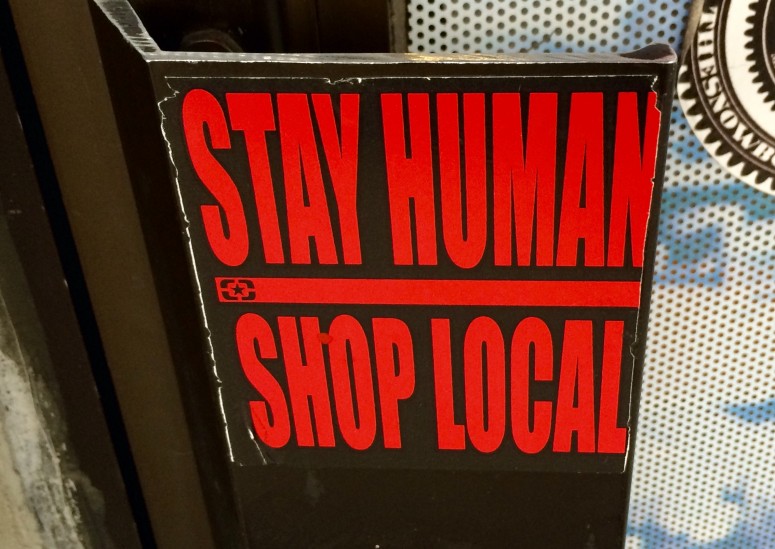Online shopping is inhuman apparently

Taken at one of my local skate shops (Photo: Blake Snow)
Outside of groceries, my household shops online 90% of the time. That’s not me overstating something. That’s my wife’s estimate. She does the budget.
Over the last 10 years, Amazon Prime, Zappos, Target.com, iTunes, Netflix, and many other e-tailers have dramatically improved my family’s standard of living, product selection, and buying power, while reducing buyer’s remorse, time spent, and money spent consuming wants and needs.
Every now and again, I get romantic and decide to “shop local,” as they say. Usually I regret it. The last time I needed a pair of slacks, I went to a big box store. The style selection wasn’t what I wanted. 30 minutes of my life, gone.
Before leaving the parking lot, I launched the Amazon app, found a better pair of 4.5/5 star fitted-pants for less, and clicked “buy now.” The transaction took two minutes. The slacks would be on my door step two days later, and if, for whatever reason, I didn’t like them, I could put them back on my door mat, and a brown truck would magically return them for free.
We live a charmed life.
After hitting a three inch crack on the Provo River trail last week, this happened. And instead of doing what I should have in the first place—look online—I got romantic again. “I’ll swing by the best-rated skate shop on Google after picking up some cilantro from the grocer,” I told myself. “It’ll be fun. I’ll get to see a bunch of cool inventory and reminisce about how I used to shop as a boy. Maybe I’ll even meet someone cool.”
Nope. Upon entering the store, what I got instead was shaming, patronizing, slow, and unwelcoming service.
“Where are your long boards?” I asked the college-aged clerk wearing unfamiliar branded clothes with a phone in his hand (probably shopping online). “Over there,” he motioned.
“How much for a deck only?” I asked, since my wheels and trucks remained fully operational. “It’s around $100 less than the listed complete price,” the clerk replied. “How much for this one?” I followed up, pointing to a slick one with a sale price of $150. “Lemme check.”
He went to his computer, where I should have gone in the first place. He started clicking and consulting the online resource of awesomeness we call The Internet. He poked at a calculator in between gazes at the information super-highway. It seemed like a lot of work. Maybe he was just estimating how much I would bear.
The offer came. “$79.” A fair price. But a little more than the initial estimate he gave, not to mention the recreational needs the job required. “Have any in the $50-60 range?” I asked. “Yeah, but not for the same quality!” he defensively replied. “Will you show them to me?” I asked.
Seemingly annoyed that a prospective customer would ask about lower-grade stock that he himself carried, the man walked me over to a couple of boards. One was really short. The other wasn’t a pintail and was raised rather high, which I didn’t like.
I thanked him for his time and headed for the door. Upon exiting, I noticed the sign which attempted to shame me for loving Amazon. “Stay human, shop local,” it read.
I realize this was a skate shop. Skaters aren’t generally the friendliest, confident, and open-minded people you’ll encounter. Many of them are annoyingly insecure. But this wasn’t an isolated retailer experience either. I’ve been “burned” elsewhere by defensive, skittish, and unsure retailers operating in an upheaved retail world. And I’m often treated the same: as a hostile intruder.
Of course, buyers aren’t hostile. They have some something sellers want—money. They best way of increasing your chances of getting that money (either today, if not tomorrow) is to help them. That’s what the internet does so well. It helps buyers, usually better than retailers.
To be clear, I still believe there’s a place for physical stories. It’s a contracted place, but there is a future for them.
There’s less of a future, however, for those who insist on shaming, attempting to make value decisions for you, or disguising their motive of selling you something under the banner of “local community.”
Is there a price for moving most of our shopping online? I’m sure there is. There are consequences for everything. But if my life and the last twenty years are any indication, the pros outweigh the cons.
Has better efficiency—in this case online shopping—ever been a total loss?
2 Comments
Surgery

Should you still be skateboarding, after back durgery? I wouldn’t.